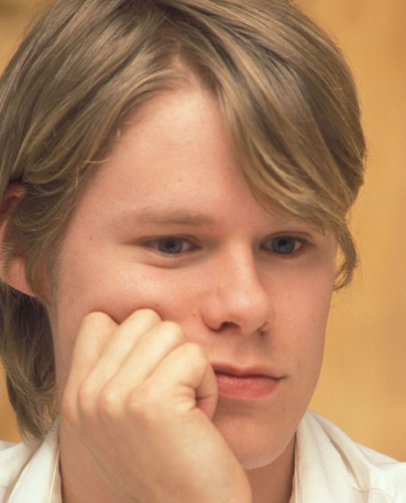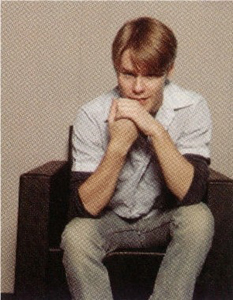
 In
1944, master gay playwright Tennessee Williams rocked American theater and
society with The Glass Menagerie. Its poetic, yet unsettlingly candid, view
of the Wingfields, a family abandoned by their father and husband, now ranks
as one of the towering achievements of 20th-Century American drama.
In
1944, master gay playwright Tennessee Williams rocked American theater and
society with The Glass Menagerie. Its poetic, yet unsettlingly candid, view
of the Wingfields, a family abandoned by their father and husband, now ranks
as one of the towering achievements of 20th-Century American drama.
The Glass Menagerie is especially relevant in 2007, given the awareness of the American public about single parents battling rocky economic times. Moreover, in subtle ways, this classic, which was inspired by Williams’s own personal experiences, codifies the playwright’s struggle with his homosexual orientation.
It’s fitting that the current Guthrie Theater revival features Queer as Folk star Randy Harrison as protagonist Tom. Indeed, given the sensitivity he revealed in that landmark television series, Harrison’s casting seems nothing less than ideal. If Williams’s spirit is out there peeking in on us, he must be ecstatic that Harrison essentially is playing him.
I spoke with Harrison recently about Williams, his play, director Joe Dowling, and Queer as Folk.
Q:
I think of Tom Wingfield as a kind of surrogate for Tennessee Williams
himself, and I feel like much of his restlessness and his disquietude
has to do with being gay. Of course, Williams couldn’t write about
that openly in the 1940s.
RH: I don’t think that’s the largest aspect of it, but I think it’s huge. I think the frustration he’s experiencing in the home has to do with his being an artist more than anything, and his realization that it’s going to be impossible for him to follow that dream [by] staying with his family.
I think [Tom’s homosexuality] could be part of it, but it totally depends upon the actor’s take, because it’s not implicit. It’s not actually in the text. It’s definitely a part of what he’s going through. Certainly, there is a lot going on that’s unspoken about him, and between him and his family.
Q:
What have you been doing to research the play and your interpretation
of the character?
RH: I’m reading Williams’s memoirs now. I’ve read a few biographies, and almost all of his plays. I’m thinking I’m almost filled up on the biographical information at this point, and I need to just come back to the play.
Q:
But there is a lot of him in the play.
RH: A huge amount.
 Q:
It’s certainly valid for you to be examining his life and work.
What are you discovering about Williams? I’ve read the memoirs.
He was pretty wild.
Q:
It’s certainly valid for you to be examining his life and work.
What are you discovering about Williams? I’ve read the memoirs.
He was pretty wild.
RH: He was. The memoirs are amazing, just because they take place so much later than when he wrote the play. The character is hugely based on him, but it’s a work of fiction ultimately, and you need to be responsible to the script of the play, not to any biographical information. But I’m amazed at how honest the memoirs are.
I had this image of his just being this mess later in his life. But they’re so astute. I know there were exaggerations and things that were left out, but they’re so honest. You really understand why his characters and his plays are so indelible in the way he writes his memoirs. You have to remind yourself of the time he wrote them—1972.
Q:
They were cutting-edge. And they contain all that wrenching stuff about
his mother, Miss Edwina, and his sister, Rose. Just heartbreaking.
RH: Devastating.
Q:
It seems like there’s a lot that surfaces in Amanda, Tom’s
mother, that we find in Miss Edwina, and a lot in Laura, Tom’s sister,
that we find in Rose.
RH: A huge amount, but more about Amanda.
Q:
Many actresses will tell you that Williams wrote some of the best female
characters in all of drama. And you played in one of the most groundbreaking
series in the history of television. Your character, Justin, is very patient,
nurturing, supportive, and he’s very sweet. I recently watched the
episode where you play his winning the King of Babylon studly beauty contest.
RH: Eight years ago!
Q:
That’s one big reason why it will be so interesting for your
TV fans to see you play Tom. He’s a very restless character—a
real contrast.
RH: It feels very, very different.
Q:
You’ve done a lot of musical theater.
RH: I haven’t done a lot of musicals in a while. I sang in college, so it was an easier way to get my Equity card, and to start working professionally. There are a lot more opportunities in it. About three years ago, I did Wicked, and since then, I’ve been doing just straight theater—Amadeus and Equus.
Q:
You portrayed the lead roles in those two very demanding pieces. And
this one is also very demanding—one of the plum men’s roles
in American drama. Many would call it the plum role for a young American
actor.
By the way, many people in the local queer community are very happy that the Guthrie has been doing Tennessee Williams plays more regularly since Joe Dowling has been Artistic Director.
Before his tenure, it seemed like Anton Chekhov and other great playwrights were emphasized. Nothing wrong with that, of course, but Dowling’s interest in Arthur Miller and Tennessee Williams has been wonderful.
Miller was hetero, but his social consciousness was second to none, and so is automatically adored by most queer theatergoers. And Williams’s unmistakably queer sensibility gives us a window into how that sensibility had to be expressed in the decades before Stonewall.
Dowling has this instinctive understanding of the mid-20th-Century American world these two giants encompassed. His production of Death of a Salesman a few years back was just spellbinding. He captured that dance between gritty reality and delicate memory. And The Glass Menagerie also dances that dance.
 RH:
He’s phenomenal, and he really understands family. And maybe this
is why you think he’s done such good work with American classics,
because so much is about family. He’s so very astute about family
dynamics.
RH:
He’s phenomenal, and he really understands family. And maybe this
is why you think he’s done such good work with American classics,
because so much is about family. He’s so very astute about family
dynamics.
A majority of this play is about this give-and-take—this pushing and pulling that happens within families. And he’s been remarkable about getting in there with us. He has such a keen eye, and such an understanding of who’s winning and who’s losing as far as the pushing and pulling.
Those kind of things really set people off when they’re in that pressure-cooker environment, being in a small home with a family—which is what Death of a Salesman is about.
Q:
There’s something Williams talks about regarding shared family
pain in Memoirs that comes through The Glass Menagerie as well.
The play’s characters, Tom and Laura, brother and sister, exist in their St. Louis tenement apartment after they had lived in a much more accepting, sylvan, and gentler environment down South.
St. Louis is this comparably harsh, horrible reality for them. Williams says in his memoirs that he feels that when his own family moved to St. Louis, it was traumatic for both him and Rose.
They found themselves ostracized, judged negatively and snobbishly by those in their community and neighborhood there. They didn’t have the same brusqueness and coarser vocal rhythms that others around them had. And they were looked down on for not having as much money.
RH: Oh, yeah. The way in which the family is isolated from the rest of the community in St. Louis. In the play, it’s not indicated whether or not they were born in the South, and moved there, or if they had been there the entire time, and just the mother was from there. But we’re choosing that we actually went on the same journey Tennessee Williams had when he left Mississippi.
Q:
I think that’s the right way to go with it.
RH: Right. The family is isolated from the rest of the community both by their being Southern and being poorer. But it is the Depression, and there’s this sense that everybody—all of America—has been forced into this desperate situation. It comes through in his monologues.
And I think they’re more isolated for being Southern. The mother comes from an entirely different reality than the one they’re attempting to live in right now. I think that’s a huge thing that’s making Tom completely restless—his being a part of that other world, and then coming back to this world.
And as he grows up, he more and more realizes the world that his family has erected—his mother specifically, but Laura, too—that he’s been forced to live in, is an illusion. And he has to separate from that in order to engage with reality, and become an adult and an artist.
Q:
Great point. The mother, Amanda, goes on about her gentlemen callers,
and has this sort of Antebellum South romanticism gone haywire.
RH: Right. And it’s the Depression. It’s not happening anymore.
Q:
That’s another thing that I think makes the play more relevant
now than, say, only a decade ago. It has a new pertinence now, because
we’re seeing a starker division between rich and poor in American
society. We’re always finding evidence about the disappearing middle
class.
Though that division has surely been creeping up on us since the ’80s, people are now more acutely aware of it. There seems to be less hope for the future, and there’s a desperation just below the surface now.
Amanda comes from a time when there were no government-funded safety nets, and now, more of our safety nets have been cut. In Amanda’s heyday, you had to have means when you were old, or a financially solvent husband who would leave you enough to live on when he died.
She talks about pitiful cases of desperate women she saw in the South—like she’s haunted by that.
RH: “Birdlike women.” That’s right.
Q:
Well I can’t wait to see you in this. You are perfect for this
role. Now, I must ask you about Queer as Folk. When did you last work
on it?
RH: It’s been about two-and-a-half years.
Q:
It really portrayed gay characters on their own terms in a brutally
honest and funny way. It showed that you can keep your soul, even in a
sex-drenched world.
RH: You know, it’s not a world that I’ve ever been a part of, so I’m not in a position to know if it was accurate or not.
Q:
I think it’s a brilliant show. It compels queer people to look
at themselves.
RH: It’s definitely gritty.
Q:
Do you miss doing it?
No. It was a wonderful job. I did it for five years. It was a long time, but it was a wonderful break for me. I learned so much working on it, but I was ready to move on when it was over.
The Glass Menagerie
Jan. 20-Mar. 25
Guthrie Theater
818 S. 2nd St., Mpls.
(612) 377-2224
www.guthrietheater.org
Edited by Marcy